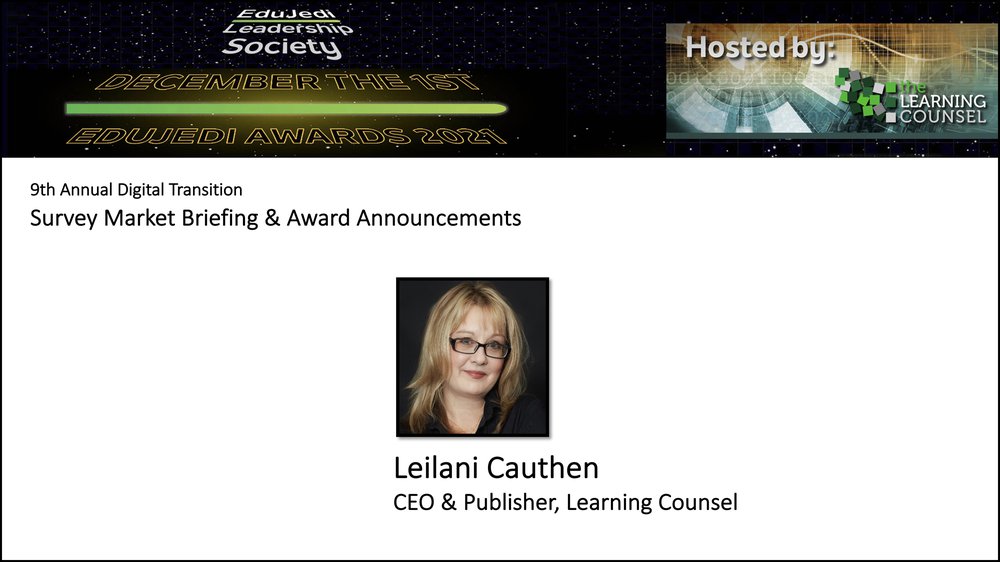Your Host LeiLani Cauthen, CEO at the Learning Counsel Publishing and Research, began the day with a Market Briefing based on the National Survey, the most comprehensive digital survey in K-12 education. According to Cauthen, “We had 21,098 educators respond to our surveys. Of those, 1,394 district and school representatives completed the full responses. Many respondents were really entering for the survey awards; As you may know, the full responses would take about an hour just to complete. All of the data that we were asking for the surveys were long and exhausting. We heard that from quite a few people, but they described the survey as really interesting, because like every survey at the Learning Counsel, people learn and they get ideas just from taking the survey.
“We kept the responses open from March shifting all the way to November 2nd, before we started analyzing all the data. This is what we got back from demographics schools and districts, including more rural responses than we've ever seen before. It really tells you a lot about what happened in the country with the pandemic; rural and suburban districts were really stepping up with technology deployment more than we've ever seen before. Just to give you some context, the Learning Counsel has shown in this series of our events. If you've met us when we were in your region and we were doing local events, you know, we've always talked about how to mature in your digital transition. Well, this is a different way to look at it. We're doing a paper right now with Promethean and we are looking at their data and our data together. That paper will be coming out later in the year but to give you some context on maturity, just to sort of set the stage for all the rest of the data, device rollouts and various apps are normally step one.
That's what, almost everybody in the country that hadn't already done so was doing in the last two years. And then they get into different teaching and learning methods and models down at the teacher level plan with how they're going to do things. Then, there's a need for mass training and you normally start seeing a lot of that last year, almost every single person in America was trained on web conferencing and a couple of other mainstream apps. And then began saying, ‘Hey, we have too many apps. We need to retire some of them. There are duplicative ones and, what are we doing?’ After that, they get into an inventory of what exactly they're going to do and a more precise professional development.
“And then they start thinking about services, disaggregation, because they may be seeing, like we saw in the last couple years, a loss to homeschooling or other alternatives and they say, ‘Hey, why don't we offer some of the homeschoolers the ability to do some of the courses, maybe in a disaggregated way or we'll do some testing or various and sundry things with use of our facilities. So that starts to go much deeper. Then they worry about personalization for every single student. And then beyond that, they get into ‘How do we Uberize a personalized path and pace for every single student?’ So they start aggregating from whole group and class structure and they end up at the very end. And this is where we think the whole market is going into what we call an experiential center, that is much more focused on leaning itself on the technology to distribute the bits and pieces of knowledge and then layering in a much more precise human teaching intersection. So it's really actually teaching, and not worrying about everything else. So that's a basic on the maturity scale.”
“So my main takeaways and the analysts takeaways from 2021 are these: The K12 market really, we saw fractured into way more alternatives with far less traditional modeling of schooling. The traditional model we used to think about with bells ringing and classes moving and groups and everybody's in a grade structure - that is pretty much no more in its pure state. Both administrators and teachers in the survey are interested in a delivery model shift. This is really big news. People are seeing that their response to the cultural shifts and what people want, a need for flexibility, is not really jiving with the old model. And they're leaning towards hybrid high flex, and blended and flipped. That's because competition really remains very high. I don't see it going away, ever.
This is just a portion of the market briefing. Find out where technology is headed, and what you can expect in technology spending, and how this year compares with the last big era of stimulus spending. You’ll also be amazed at the amount of time your teachers are spending now on lesson planning, and how that affects the time teachers have for teaching. It’s a real eye-opener. This is the briefing that everyone waits all year for. Prepare to be surprised, amazed and thoroughly briefed!











